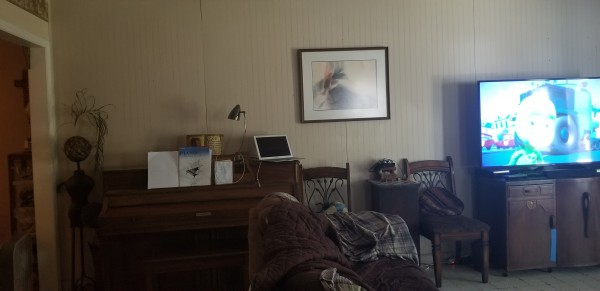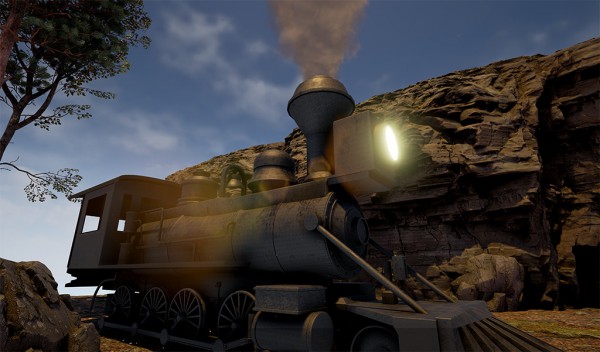
Interview with Michael, a VFX artist that works remotely
How did you get started with remote work?
In college while I did the assignments the professor’s would answer questions and most of my questions pertained to freelance work. I never thought I would get a studio job right off the bat, and I put most of my effort learning everything I could, as much as I could.
So I put all the information I had together right after college and went into business for myself and it was slow. It picked up here and there, but after a year the work increased a lot by working with others.
So my first gig was paying a 15% to my contractor to find me work. After 2 years, the money was still better than when I started but still it just wasn’t enough. So I tried going solo again with a lot more experience. I had some setbacks that withheld my 100% time to remote work though. New addition to the family, Hurricane Harvey, money issues, car breaking down, house payments, it was rough for that year.
So initially going back into work for myself I had to work cleaning up hurricane debris for 4 months to save up to build another computer. I still watched videos on YouTube learning on my free time, because after all the work that I did I understood more what artists do with their work.
The shortcuts helped immensely and finally when everything was rebuilt I jumped back into the freelance work. I went from college to only knowing Maya, Udk, and some Python scripting. To rigging, texturing, hair systems, fluid systems, visual effects, material shaders, architectural visualization, and so much more.
With the experience though, I signed NDA’s, or non-disclosure agreements, so showing a lot of it was out of the question to former clients. Work was lost with the hard drive being fried, and my personal server had data corruption.
Starting back at the position I was in before but with more experience I decided to work part time and do freelance work while perfecting a demo reel to attract future clients. So far I’ve had one client in the first week for some small work, but it’s a start and sooner or later I’m positive I can make more satisfied customers and enjoy making the art I’ve always loved creating.
Read 114 answers from other remote workers
What are you working on?
I’m currently working on a Wild West short cg in real-time using Unreal utilizing everything I’ve learned with a story to it. Have the basic assets and some of the models revisiting things that I want to look better.
A link to the reel in progress can be found on ArtStation.
I am also working on a small Kickstarter for a Halloween project still setting everything up, and some Upwork projects when I get a client.
Read 107 answers from other remote workers
What's your typical work routine?
On a typical day with work I wake up around 9 a.m. and open the documents for the project I am currently working on. I usually save the work I had and leave the project files up in the folders so I know exactly where I left off with a few foot notes.
I take 3 smoke breaks and 1 lunch break throughout the day. If it is just one big project I tend to only make sure I am awake during milestone interviews that usually have the team I am working with Skype message and discuss everything that is finished and needs to be finished.
On days such as those, it’s hard to say when I would be awake and when I would be sleep because I stay awake for up to 20 hrs sometimes. Especially if it is something that hasn’t been done before and I have to figure it out myself.
Read 92 answers from other remote workers
Do you have a dedicated space to work?
I have my own office where I have my computer set up with 2 monitors, my VR equipment, my tablets, and a second desk for my laptop which I currently use to hold documents. I have to separate myself from everything else to focus on work no distractions is best for me.

Read 93 answers from other remote workers
How do you manage having too much or not enough work?
This is a tough question to answer because in crunch mode, where I work 20 hrs with just a coffee and snickers bar, I tend to be so focused on the work I don’t track the time very well.
The only thing on my mind is to finish the work I have laid in front of me by this set time so I can work on the next part by the next set time.
When there isn’t enough work I work part time at a store, fix television sets, washers, dryers, electrical wiring, cars and trucks, mow lawns, to keep up with the bills. I also don’t like to stress over not enough work either so I also tend to relax and take the kids to the beach or watch a movie go to the gym or work on my own personal projects.
Read 18 answers from other remote workers
What tools do you use to stay productive?
I mainly use Photoshop, Maya, and after effects as a base to start anything.
Some scripts for rigging, visual effects, modeling come in handy for a faster workflow and a tablet with a stylus pen for sculpting in Zbrush.
Quixel Suite is very useful for using masks as a pre base texture for baking later. The rest of the tools are as needed but a long list.
Simplygon is very useful for performance issues. It’s basically the main tools, the middleware, scripts, and then compositing software.
Last I use Obs Studio to record video for clients of my screenplay. So if I’m doing something in visual effects I have a client window open from the game engine to record the window with Obs Studio.
Some other software I use for my VFX work includes: 3ds Studio Max, Realflow, Cinema4d, Blender, Nuke, After Effects, Iclone, Substance Painter, Substance Designer, Quixel Suite, Marvelous Designer, Zbrush, Mudbox, Modo, World Machine, Visual Studio, Unity, Unreal Engine, Houdini, Mental Ray, Krakatoa, V-ray
Read 108 answers from other remote workers
How do you stay on task?
Organization is probably the most useful tip I can say.
Honestly when I first started I was semi organized and had to search for things constantly because I always rushed. I know there are deadlines but rushing never helps.
Also, sleep is very important you can work for 2 days straight but your brain will slow down in functionality literally. I remember I forgot how to do something simple cause I stayed awake so long working on a project.
I went to sleep, woke up in 10 hours and took me 10 minutes to finish the task vs the hour I spent on it.
Even if you don't think you need it sleep it will increase productivity.
A nice trick I use in my office is to work when there is nothing to distract me. That is probably the hardest thing to do because there are a million things at home that can distract me.
Snacking is a simple way to keep you focused on task. Just keep a candy bar or a sandwich next to you with a drink the only break you'll need to take is a restroom or cigarette break.
Lastly, taking a break and saving constantly will be a lifeline. Have an auto save function setup for whatever software package you have you can Google a script for it each software package should have one. Not only will the earlier saves be helpful in case you absolutely have to upgrade and it corrupts the save and only previous saves work, but in case you have to go back to an earlier save for whatever reason you are already set.
Taking breaks keeps your head on straight, there is no reason to stress to the point you have a headache that just makes it worse when trying to work on something. I can't count how many times I had to leave my desk for just 5 minutes because the software crashed, or it bugged and you had to default it then reload all scripts.

Read 100 answers from other remote workers
What do you like about remote work?
I get to be home with my son more that’s almost nonexistent with other jobs.
You get to choose which clients to pursue, and some will pursue you.
You get to meet interesting people, I mean not in person but still pretty cool.
All kinds of ethnicities different cultures accents when you speak to people. That is probably the coolest part to me besides hanging out with my kids, meeting new people.
You get to see how people work professionally which helps you grow and mature yourself into someone more prone to a business atmosphere.
You make friends from all around the world; I still talk to some friends across the United States, Germany, Canada, and other countries.
In a sense it helps you as an artist feel complete.
I mean you can see your friends get hired at awesome jobs and wonder when you will get your shot, but honestly as a past goal I don't mind where I work. Just as long as I get a chance to create something and feel good about making it, I can honestly say remote work has done it for me.
It has challenged me quite a few times when I’ve had to fix other’s work, but I’ve grown as an artist and have a much larger knowledge base than I did when I went to college.
Read 106 answers from other remote workers
What do you not like about remote work?
It is very inconsistent to say the least. There are times I may get to work for 6 months which is great, and then no work for 6 months.
Some of the clients aren’t very understanding at all. When Hurricane Harvey hit south Texas I was in the middle of a contract where the power went out. They were so angry with me telling me to use my hotspot and a laptop to finish, but it was a natural disaster there was no power anywhere. After I went through all the extra effort to turn in something I wasn’t even paid for the work.
Some clients won’t pay out for the work you do for them, which is one reason I started at Upwork. I had one client I told not to update the software without reworking all of the scripts and they did it anyway a year later. Came back and told me to fix it because it was my fault it doesn’t work anymore.
I’ve even had a client not like the fact the person they hired wasn’t the person they wanted to see.
So a summary of not enough work, rude clients, chance of not getting paid unless you use something to manage your accounts such as Upwork, and slow.
Do not get me wrong, not all clients are like these I’ve had about 5 really horrible clients and about 14 good ones so far.
Documenting everything that includes chat logs, phone conversations, emails, contracts, company name, contractor information, phone numbers if given, literally every time I have had an issue with a client I go back to my documentation.
People in general are human and if they don’t understand why something happened or they don’t remember it is your job to make sure you can go back and find where something was done or said.
Skype saves message chat logs forever in your settings. No one should be able to rip you off if you keep everything filed. Upload it to a secondary cloud server so you will never have to worry about it.
Read 103 answers from other remote workers
What contributes to being a successful freelancer?
A lot of effort needs to be put into it.
It’s not just diving in head first and expect work. You have to go for the legal side of it as well.
Most jobs under a certain amount just aren’t worth the effort cause if someone doesn’t pay you $100 you can sue in small claims but you’d waste more money than you would get in return.
I only take small jobs that take me an hour maximum usually unless I feel the client is a sincere person. Also, they need to have a very good track record—do the research on anyone you work for on big jobs.
Read every piece of a contract, I’ve had a contract state that I would have to rework anything for free for up to 6 months in very fine print before. Technically if it took me a week to finish I would have to work for free for 6 months after it was turned in.
Keep a trust to a very small circle. Have a client earn your trust and vice versa, this way you and the client get a better feeling of how to work with each other and create a more respectable workplace.
Never say you can do something that you cannot. For instance, I can read code and write it to a degree but I am in no shape a programmer. I can program what I need in python or JavaScript, like a rigging toolset for myself, or fix code in C++. As I said I’m no programmer so what would take me 2 to 3 days would take a programmer 1 day or less.
In the event a natural disaster happens inform your client so they can be prepared, but if they want you to travel in the middle of a hurricane or mudslide the money just isn’t worth it your well-being is more important.
Networking is very important as well, I’ve helped a few people from college get some work when it was plentiful to me, and some of them have told me about jobs that are posted early to help me get a quick foot into the interview section.
Read 19 answers from other remote workers
What did we forget to ask Michael Mason?
At RemoteHabits we're always trying to improve our interviews, what question should we have asked Michael Mason?
Biography
Michael Mason
Michael Mason is a VFX generalist who lives in Texas and creates 3d visual effects for game engines, and movies. Learn more about hiring him at ArtStation or by emailing.
Work remotely? Share your story on RemoteHabits!
Want to be interviewed? If you have a remote position, head over to the interview me page!
Looking for a remote job?
RemoteHabits Jobs has everything you need to find your next great remote work position!
Related Interviews
Interview with Dani and Luca, digital nomads who have mastered work and travel
Dani and Luca have mastered the art of traveling while working—see their hacks & tips for thriving as digital nomads.
Interview with Scott about working remotely for 20 years
Scott is a designer and developer that's been working remotely since 1998, read his interview to learn how he's been successful
Interview with Rosemary, a digital content marketing manager reveals must-see freelance tips
Rosemary, a digital content marketing manager shares the freelance lessons she has learned over the years—see her tips & exceptional entrepreneurial wisdom.


